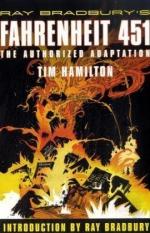|
This section contains 7,981 words (approx. 27 pages at 300 words per page) |

|
SOURCE: "Entering the Space Frontier: Quests Mundane, Profane, and Divine," in Ray Bradbury, Twayne Publishers, 1986, pp. 63-81.
In the following essay, Mogen explores mythopoetic elements in Bradbury's space-frontier fiction.
Bradbury's space-colonization fiction integrates two major myth systems to express the significance of mankind entering unearthly new environments: the biblical myths of the Garden and the Promised Land, and the American myth of the frontier. In fusing these myth systems Bradbury participates in an American literary tradition extending from contemporary science fiction back to initial responses to the New World of America. Since the first ambivalent Puritan accounts of their errand into the wilderness, American writing about frontier experience has evoked, explicitly or implicitly, these biblical analogies. And, given the strength of this tradition of frontier writing, it was only natural for Bradbury and other American science-fiction writers to dramatize the romance of space travel in terms of this...
|
This section contains 7,981 words (approx. 27 pages at 300 words per page) |

|


